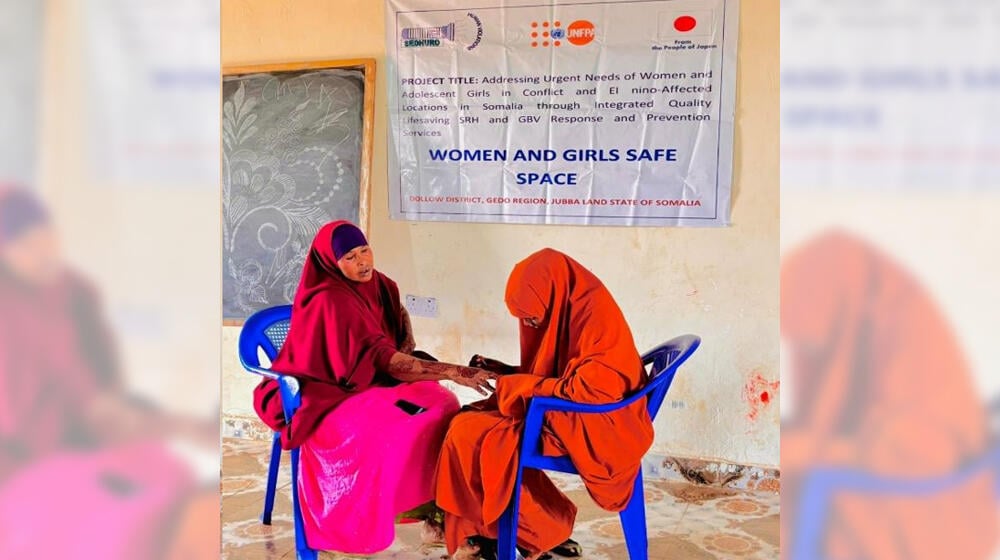In the dusty, arid plains of Jubaland, where the land was once lush and green, life took a devastating turn for 17-year-old Farhio Abdi and her family. January 2023 marked the beginning of a desperate journey. Ravaged by unrelenting droughts and floods, their home became uninhabitable, forcing them to flee with whatever they could carry. Alongside her five brothers and three sisters, Farhio and her family made their way to the Kaharay IDP camp in Doolow, seeking refuge and a glimmer of hope.
For Farhio, that glimmer of hope arrived in the form of the Women and Girls Safe Space (WGSS), a sanctuary funded by the Government of Japan through UNFPA and implemented by the local NGO, SEDHURO. But to Farhio, this was more than just a physical space; it was a lifeline.
Within the walls of the WGSS, Farhio found solace and support. The trauma of displacement began to heal through the psychosocial services provided, and slowly, she started to reclaim a sense of normalcy. The WGSS offered more than just emotional support; it became a hub of empowerment and transformation. Here, Farhio discovered a training program that would forever change her life.
Farhio had always possessed an artistic flair, a natural talent that she hadn’t fully realized until she was introduced to the ancient art of Henna. In the Somali culture, Henna is more than just body art; it is a symbol of beauty, tradition, and femininity. Under the guidance of the WGSS, Farhio honed her skills, mastering the intricate designs that make Henna so revered among Somali women.
With her newfound expertise, Farhio did something extraordinary. She transformed her talent into a means of livelihood, becoming a mobile Henna artist. "I became a mobile beauty Henna artist, weaving intricate designs on the hands and legs of women in the IDP camp and in the town," Farhio shared, her eyes gleaming with pride. What started as a therapeutic activity soon turned into a source of empowerment and independence.
Today, Farhio is no longer just a beneficiary of UNFPA’s programs; she is a budding entrepreneur.
Her Henna designs are in high demand, bringing in a steady income of around $160 a month—a significant sum for her family in the camp.
This income has not only eased the financial burden on her family but also given Farhio a renewed sense of purpose and dignity.
Farhio’s story is a powerful testament to the transformational effects of humanitarian assistance. It shows that investment in safe spaces and skills training for women and girls in crisis is not just about alleviating immediate suffering; it is about planting seeds of hope and fostering self-reliance. It is about empowering women like Farhio to become agents of change—not just for themselves, but for their families and communities.
With ongoing support from the Government of Japan and UNFPA, young women like Farhio are now writing new stories of inspiration in Doolow and across Somalia. These are not tales of despair or displacement but of a flourishing future where women are proud, self-reliant, and strong. By funding GBV programs like WGSS, UNFPA offers more than just short-term relief; they deliver the promise and gift of power to a generation of women and girls, enabling them to build a better future for themselves—one beautiful Henna design at a time.


